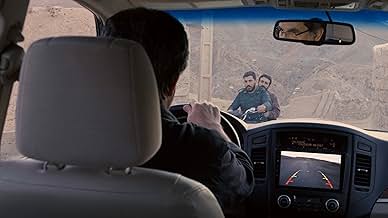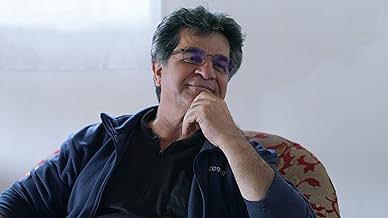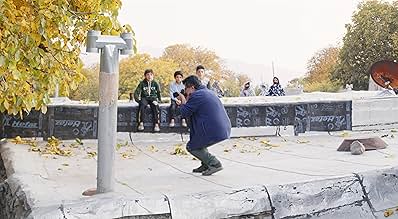IMDb-BEWERTUNG
7,2/10
4673
IHRE BEWERTUNG
Folgen Sie Anders Hofman, dem ersten Menschen, der einen Iron-Man-Triathlon in der Antarktis absolviert hat.Folgen Sie Anders Hofman, dem ersten Menschen, der einen Iron-Man-Triathlon in der Antarktis absolviert hat.Folgen Sie Anders Hofman, dem ersten Menschen, der einen Iron-Man-Triathlon in der Antarktis absolviert hat.
- Auszeichnungen
- 4 Gewinne & 8 Nominierungen insgesamt
Bakhtiyar Panjeei
- Bakhtiar
- (as Bakhtiar Panjei)
Narges Delaram
- Ghanbar's mother (Madar_e Ghanbar)
- (as Narjes Delaram)
Reza Heidari
- Reza
- (as Reza Heydari)
Aliye Tuzun
- Police
- (as Aliye Tüzün)
Empfohlene Bewertungen
No Bears is a metafictional exploration by Jafar Panahi, tackling the social and political restraints placed on himself and others. While the subject matter might seem daunting, the film is surprisingly accessible. Despite its gravity, it maintains a humble, understated tone, grounded by Panahi's calm demeanour, honesty, and politeness. Moments of dark-tinged humour-like Panahi reviewing footage accidentally left running on a camera-lighten the tension.
Panahi stars as himself, directing a film about two people attempting to migrate illegally, which is presented as a semi-documentary. In a unique twist, No Bears becomes a semi-documentary within a semi-documentary, blurring the boundaries of fiction and reality. Panahi has relocated to a small village near the Turkish border to direct remotely via webcam, as he was subject to a chronic travel ban at the time. Perhaps he sought proximity to his crew or a respite from the surveillance of Tehran. However, his interactions with the local villagers and the tensions of living near the border create a layered narrative that reflects both the film's themes and Panahi's real-life challenges. The frequent disruptions to his work caused by poor internet signal serve as a fitting metaphor for the control and limitations imposed on his creative freedom.
At its core, No Bears is a film about resistance. Panahi refuses to bow to Iranian authorities' attempts to silence him. His dealings with the villagers mirror his experiences with the regime-both characterised by arbitrary rules, superstitions, and traditions that he quietly defies. Acting as a beacon of reason, Panahi invites viewers to question the power of authoritarian systems, suggesting that their strength lies in collective compliance. The title, No Bears, reflects this theme. Villagers keep the young indoors with tales of bears prowling at night, but no such bears exist-a lie that encapsulates the broader dangers of imagined fears used as tools of control.
Panahi's calm rationality contrasts with the fabrications and self-deceptions around him. He resists not only the idea of leaving Iran to escape its constraints but also the notion that he should be forced to abandon his homeland to live freely. Why should he, or anyone, have to leave to live authentically?
Beneath Panahi's serene exterior lies a quiet yet profound frustration-his inability to fully integrate, to prevent tragedy, or to appeal to others' sense of reason. He is like Lemuel Gulliver, bound by the Lilliputians, constrained by a system of small yet unyielding forces.
Panahi stars as himself, directing a film about two people attempting to migrate illegally, which is presented as a semi-documentary. In a unique twist, No Bears becomes a semi-documentary within a semi-documentary, blurring the boundaries of fiction and reality. Panahi has relocated to a small village near the Turkish border to direct remotely via webcam, as he was subject to a chronic travel ban at the time. Perhaps he sought proximity to his crew or a respite from the surveillance of Tehran. However, his interactions with the local villagers and the tensions of living near the border create a layered narrative that reflects both the film's themes and Panahi's real-life challenges. The frequent disruptions to his work caused by poor internet signal serve as a fitting metaphor for the control and limitations imposed on his creative freedom.
At its core, No Bears is a film about resistance. Panahi refuses to bow to Iranian authorities' attempts to silence him. His dealings with the villagers mirror his experiences with the regime-both characterised by arbitrary rules, superstitions, and traditions that he quietly defies. Acting as a beacon of reason, Panahi invites viewers to question the power of authoritarian systems, suggesting that their strength lies in collective compliance. The title, No Bears, reflects this theme. Villagers keep the young indoors with tales of bears prowling at night, but no such bears exist-a lie that encapsulates the broader dangers of imagined fears used as tools of control.
Panahi's calm rationality contrasts with the fabrications and self-deceptions around him. He resists not only the idea of leaving Iran to escape its constraints but also the notion that he should be forced to abandon his homeland to live freely. Why should he, or anyone, have to leave to live authentically?
Beneath Panahi's serene exterior lies a quiet yet profound frustration-his inability to fully integrate, to prevent tragedy, or to appeal to others' sense of reason. He is like Lemuel Gulliver, bound by the Lilliputians, constrained by a system of small yet unyielding forces.
A masterfully crafted film that showcases the incredible talent of Iranian director Jafar Panahi. Despite facing constant harassment and a six-year prison sentence on baseless charges, Panahi continues to push the boundaries of cinema with his deeply personal and thought-provoking work.
In "No Bears," Panahi plays a fictionalized version of himself as he directs a film remotely from the Iranian village of Joban, near Turkey. When his WiFi goes out, he becomes intrigued by a local ceremony and loans one of his cameras to a villager to document it. The film then follows two parallel tracks: the story of Bakhtiar and Zara, which serves as a reconstruction of a real-life event, and the recording of the ceremony, which opens up a can of worms in the village as it is used as evidence against a young woman accused of having premarital relations.
Throughout the film, Panahi deftly explores themes of truth-telling, social activism, and the blurred lines between reality and fiction. The acting is superb, with Bakhtiar and Zara's tumultuous relationship feeling both realistic and emotionally charged. The cinematography and direction are also top-notch, with the film's remote setting adding to its sense of isolation and tension.
Overall, "No Bears" is a powerful and thought-provoking film that showcases the resilience and determination of its director. It is a must-see for fans of Panahi's work and anyone interested in the intersection of art and politics.
In "No Bears," Panahi plays a fictionalized version of himself as he directs a film remotely from the Iranian village of Joban, near Turkey. When his WiFi goes out, he becomes intrigued by a local ceremony and loans one of his cameras to a villager to document it. The film then follows two parallel tracks: the story of Bakhtiar and Zara, which serves as a reconstruction of a real-life event, and the recording of the ceremony, which opens up a can of worms in the village as it is used as evidence against a young woman accused of having premarital relations.
Throughout the film, Panahi deftly explores themes of truth-telling, social activism, and the blurred lines between reality and fiction. The acting is superb, with Bakhtiar and Zara's tumultuous relationship feeling both realistic and emotionally charged. The cinematography and direction are also top-notch, with the film's remote setting adding to its sense of isolation and tension.
Overall, "No Bears" is a powerful and thought-provoking film that showcases the resilience and determination of its director. It is a must-see for fans of Panahi's work and anyone interested in the intersection of art and politics.
Telling the truth is difficult for Iranian filmmakers. You have Government control on one hand (the real tale of Panahi remotely directing a film being shot in Turkey while stationed on the borders of Iran as he is not allowed to leave the country) and you have quaint traditions on the other (in the Iranian villages on the border) that often lead to tragedy. However good your intent, the road is bumpy and leads you to a sad, nihilistic end. Intelligent filmmaking that captures the difficulty of renowned filmmakers to capture the Kafkesque ground reality in Iran and the frustrations of Iranian nationals today. Deserved the Special Jury Prize at Venice.
Film director Jafar Panahi is prohibited from leaving Iran, but is trying to make a film in neighbouring Turkey. In order to make that work, he moves to a remote village near the border, where the communications are a bit hit and miss. With the help of his obliging host "Ghanbar" (Vahid Mobaseri), though, he tries to make the best of it. Initially, it's a friendly village but when he takes (or doesn't!) a photograph of a young couple, he finds himself drawn into an increasingly acrid stand-off between two young men, and their families, to whom a girl may have been betrothed when her umbilical cord was cut. His frustrations with these encroachments are not helped by production difficulties with the two two stars of his documentary-style film - real life lovers who are trying to find a way to escape, safely, to Paris. There is the slightest hint of menace here as the plot develops and although we see little actual evidence, there is a distinct sense that this man is increasingly unwelcome, despite the platitudes from the villagers, encouraging a sixth-sense feeling that the authorities are distantly watching this film-maker. There is a distinct perception of intimidation! What is also clear is that these ordinary Iranian people live in fear of the police, the Revolutionary guard and that rather flies in the face of their genuine, peaceable and hospitable, nature. Now, perhaps Panahi's less-is-more style works for some, but for me I found this all rather a slow watch. He shuffles around with little useful dialogue to develop his on-screen persona, nor my interest in him. Clearly this is a story about freedom and a sort of subliminal oppression but somehow the characters themselves here didn't really develop that theme sufficiently, nor did they really engage me. The ending, too, is disappointing and inconclusive in equal measure and I was rather underwhelmed. The film does offer us an interesting depiction of rural life that probably hasn't changed in millennia, but somehow I felt little better than a fly on the wall with nowhere near enough to go on to join in. Perhaps just too much of this is predicated on a knowledge by the audience of this director and of his relationship with his government.
The movie "No Bears" has a sensitive and dramatic plot against the backdrop of political, religious, tradition, and cultural repression in the current Iranian world. There are two love stories told in parallel by the excellent director Jafar Panahi, who himself suffers military repression for his political movies that challenge the dictatorial Iranian government. Jafar Panahi manages to capture and transmit all the tension that Iranians suffer under the eyes of the so-called Cultural Police. We sense the pressure in the air and nobody wants to compromise or get involved or close to citizens considered traitors to the country and to the traditional customs.
Like many other incredible Iranian movies, "No Bears" is second to none in terms of quality. Simple in showing the daily life of a village and the background of filming a movie, but also bold in showing us what it's like to live in a repressive regime and not bend.
Like many other incredible Iranian movies, "No Bears" is second to none in terms of quality. Simple in showing the daily life of a village and the background of filming a movie, but also bold in showing us what it's like to live in a repressive regime and not bend.
Wusstest du schon
- WissenswertesActually, the entire scene shot in Istanbul Kadikoy, not in Turkish border town.
Top-Auswahl
Melde dich zum Bewerten an und greife auf die Watchlist für personalisierte Empfehlungen zu.
- How long is No Bears?Powered by Alexa
Details
Box Office
- Bruttoertrag in den USA und Kanada
- 167.333 $
- Eröffnungswochenende in den USA und in Kanada
- 6.173 $
- 25. Dez. 2022
- Weltweiter Bruttoertrag
- 1.196.288 $
- Laufzeit1 Stunde 46 Minuten
- Farbe
- Seitenverhältnis
- 1.85 : 1
Zu dieser Seite beitragen
Bearbeitung vorschlagen oder fehlenden Inhalt hinzufügen























